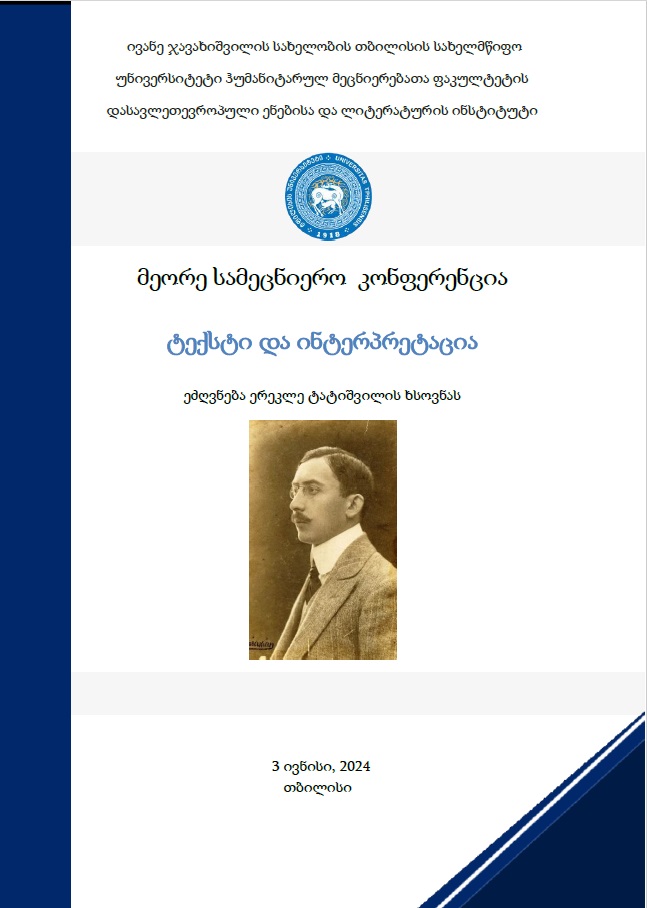The characters’ perspective of time and space in William Faulkner’s “Light in August”
Keywords:
Faulkner, Time, Space.Abstract
In “Light in August” by William Faulkner, the different spatio-temporal perspective of the characters creates the chronotope where the regularities of objective reality fail. To Lena Grove, time is a concept measuring distance. Meantime, the reader compares her movement to immobility that, in its turn, makes the character a symbol of eternity. From the character’s perspective, who is constantly on the road, everything is still and immobile around. The principle of synthesizing two mutually exclusive concepts – mobility and immobility - can be considered one of the main qualities of the chronotope of the novel.
While Lena Grove is not affected by the passage of time, another protagonist of the novel, Gail Hightower, belongs to those intellectual characters of Faulkner who have a different, intensified perception of the time and whom Richard Chase refers to as “ruined by time” (Chase, 1970, p. 17). The reader finds Lena being constantly on the road and, therefore, is associated with mother nature, the present time and the changes related to the road. On the contrary, Gail Hightower embodies a small, unpainted, bungalow-like house, which in turn represents staticity and the intolerability of any change. Meanwhile, Hightower is engaged in a hostile relationship against the passage of time threatening the icons of the past with oblivion. Attachment to the past and separation from mechanical time is also demonstrated by the fact that Hightower does not need a watch. Therefore, he is the only character in the novel who perceives detachment from the moment of so-called objective reality with all its essence. He considers music/chanting and fusion to the past as the instruments of the "destruction" of physical space and mechanical time. It reminds the reader of the conception of Levi-Strauss related to the means of escape from the flux of time - Mythos and Melos.
The passage of time is measured by the transition from one psychological state to another for Joe Christmas. Major transformative life events are predominantly associated with the spaces sharply embedded in his mind. For example, childhood, when one’s mind begins to remember things and events, is associated with the cold walls of the orphanage building and its corridor that represents, in its turn, one of the frequently mentioned spatial symbols in the novel and symbolizes the path of life. While the corridor is associated with childhood and the event related to the dietitian, which is deeply embedded in his mind, the subsequent determining event to become a man is connected with his foster parents’ barn, where Mr. McEachern remorselessly beats the eight-year-old Joe for not learning the catechism by heart. Thus, the day of bearing the physical suffering is associated with the initiation, the transition from childhood to manhood in the character’s memory.
The close connection between the surrounding environment and individuals represents one of the main features of the novel. The characters symbolize various artistic spaces and attain their features as if their fate were connected with these places.
References:
Chase, R. (1970). Faulkner’s Light in August. . In. D. L. Minter (Ed.), Twentieth Century Interpretations of Light in August. A collection of Critical Essays. 17-24. New Jersey: Prentice-Hall, Inc.
Faulkner, W. (1950). Light in August. New York: The Modern Library.
Pitavy, F. L. (1970). The Landscape in “Light in August”. The Mississippi Quarterly, 23(3), 265–272. http://www.jstor.org/stable/26473865
Rice, J. C. (1975). ORPHEUS AND THE HELLISH UNITY IN “LIGHT IN AUGUST.” The Centennial Review, 19(1), 380–396. http://www.jstor.org/stable/23738051
Slabey, R. M. (1960). Joe Christmas, Faulkner’s Marginal Man. Phylon (1960-), 21(3), 266–277. https://doi.org/10.2307/273905

